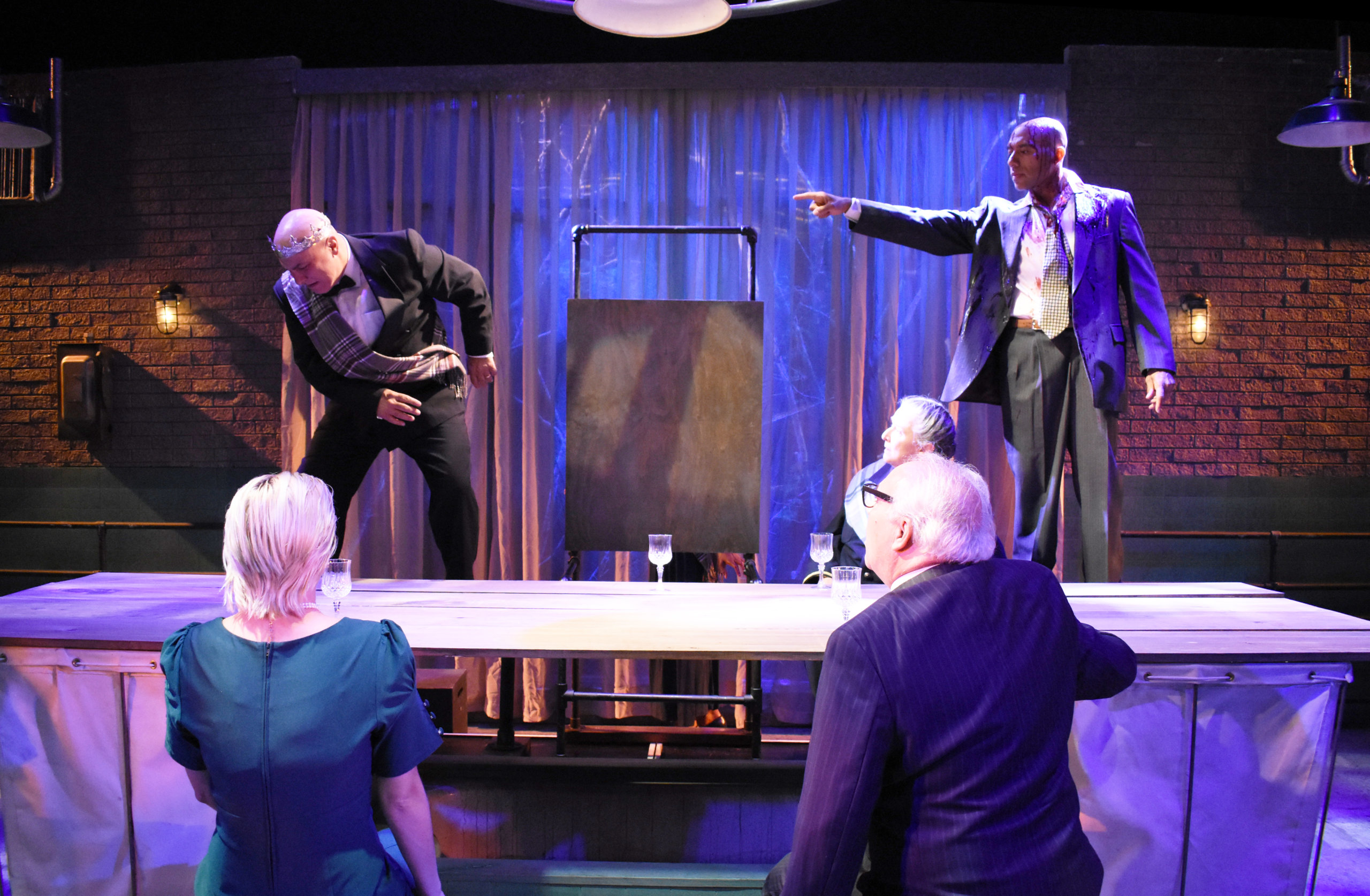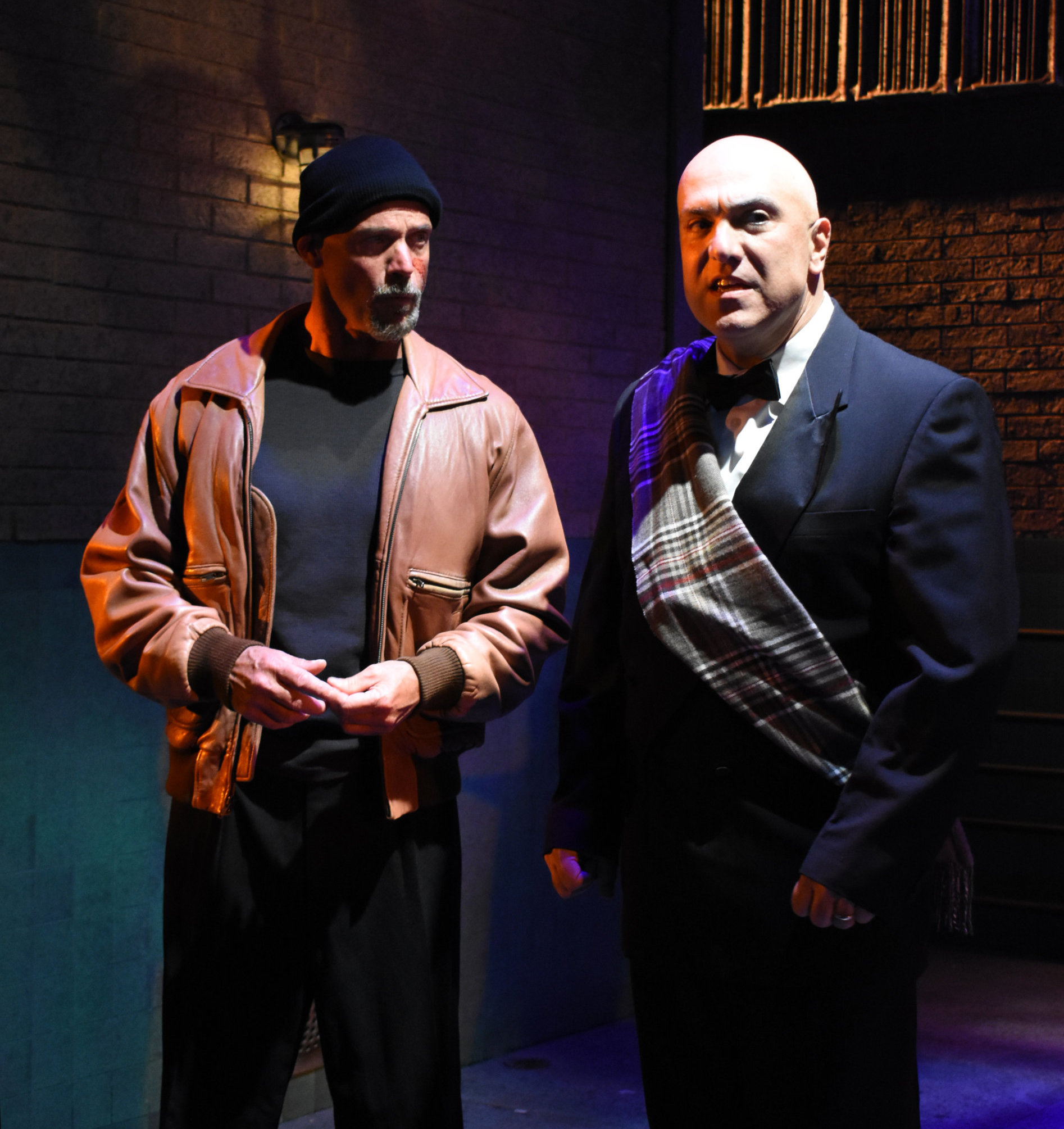Literature Live! Bay Street's Battle for Macbeth

Bay Street Theater’s Literature Live!, a BOCES-approved arts-in-education program providing performances of famous literary works to middle and high school students, returns with a wild take on Shakespeare’s Macbeth, a new distribution method and a hard-fought effort to make it happen.
While Bay Street Theater did reopen for in-person shows this summer, local schools weren’t quite ready to sign their students up for theater field trips, so Bay Street had to get creative. They decided on a pre-recorded performance that would be rehearsed in three days, shot in under a week and made available on-demand in early November. At first glance, it seems to be a brutally uphill battle, nigh impossible, but Bay Street’s army was stacked with titans.
Director Allen O’Reilly (King Duncan), Bay Street’s Director of Education and Community Outreach, led the charge, recruiting six additional actors to join him in portraying 24 roles: Matthew Henerson (Macbeth), Erin Margaret Pettigrew (Lady Macbeth), Genevieve Simon (Malcolm), Joe Pallister (Macduff), Teresa DeBerry (Ross) and Gabe Portuondo (Banquo). As an associate artist at Georgia Shakespeare for 24 seasons, with a dozen Macbeth productions under his belt as actor and/or director, O’Reilly was well-suited for the difficult task at hand.
For the setting, 1963 Scotland was chosen, as it’s both the distant past for teenagers and recent enough that Bay Street’s on-hand contemporary costume collection would serve it well. As O’Reilly reasons, “If you can tell the story with Armani just as well, if not better than armor, go with the Armani.”
Taking inspiration from One Flew Over the Cuckoo’s Nest, Castle Inverness has been replaced with a sterile sanatorium, where Macbeth resides as a mental patient living out the nightmare of this classic tragedy. The witches, too, are changed — now functional nurses and orderlies harvesting the battlefield for limbs and viscera to use in their unsavory brews.
While O’Reilly had to shorten the play to a comfortable screening runtime — plus the added talkback between the show’s creators and actors — none of Shakespeare’s English was altered in any way.

Despite the abbreviated script, the challenge of memorizing one’s part in a mere three days was a lofty goal, especially for the actor of the title character who (in the original script) speaks a total of 715 lines, compared to the play’s second most frequent speaker, Lady Macbeth, at 259 lines. Wisely, O’Reilly chose a Macbeth veteran, Henerson, who had performed in the show five times prior to Bay Street and twice as Macbeth himself, and he was eager to dive back into the play.
“It’s the marvelous thing about these plays: Every time you come into contact with them — whether you’re watching them, reading them or doing them — you pull something new,” Henerson shares, adding that his image of Macbeth after watching Jon Finch’s portrayal was that of a talkative thug. “This time through, I realized that I don’t know if Macbeth is a thug, but he’s far more comfortable with the world of the physical than the world of the mental. In fact, it’s the world of the mental that destroys him.”
Henerson praises the entire cast and crew, saying this seemingly impossible job “could’ve been a nightmarish process, but it was an utter delight.” And the daunting choregraphed swordfight between Macbeth and Macduff at the end of the play? Fight Director Rick Sordelet had Henerson and Pallister trained and filming in about half-an-hour. “A genuine magician!” Henerson calls him.
O’Reilly shares that the themes he chose to bring to the forefront were the way people deal with death, emphasizing the implied death of the Macbeths’ child and the empty nest it left them with, and free will. “It may seem, in this production, that we highlight the functions of the witches and how much influence they have on Macbeth,” he says. “They’re perhaps more omnipresent throughout than in most other productions, which I thought worked well for this, but all that being said, they don’t put the knife in his hand.”
Whether Shakespeare is pushing definable lessons to be learned from these themes or simply pondering them is up for debate, but to do so may be missing the point entirely.
“I don’t think Shakespeare was in the lesson business. I think it’s tempting to regard Shakespeare, because he’s an astonishingly good writer, as somehow writing for the ages and writing for people to ponder his great thoughts hundreds of years in the future. He was writing to make money,” Henerson explains, adding that the playwright’s goal was largely entertainment and that’s what will keep young people engaged today. “I would like students to find the play exciting and suspenseful. I want students to lean toward Shakespeare, because there is so much in Shakespeare both right off the page but especially seen in the theater — there is so much he has to offer us as far as insight into the human condition goes, and as far as good, solid fun goes.”
Bay Street’s Macbeth finished filming on October 22, and students will be able to enjoy the fruits of their labor via free-for-schools on-demand streaming starting Monday, November 8 through Sunday, December 5. The general public can gain access to on-demand streaming for $20 beginning Tuesday, November 9.
Tickets are available through the box office by calling 631-725-9500 Tuesday through Sunday or 24/7 at baystreet.org.



